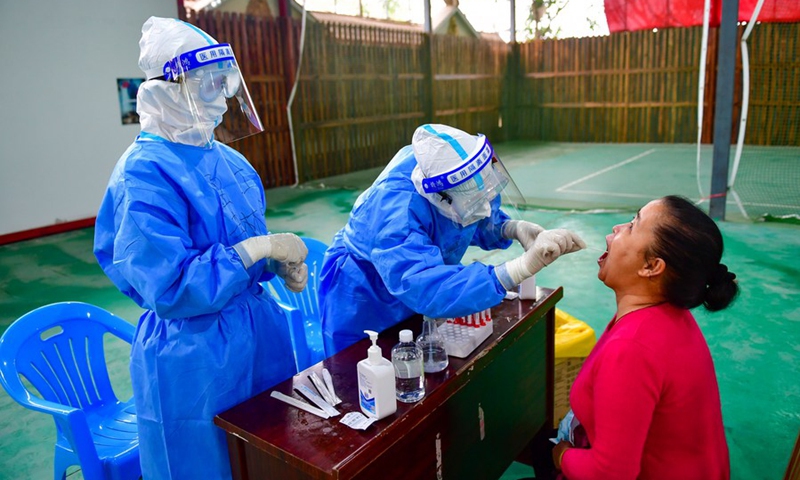
A medical worker takes a swab sample from a woman for COVID-19 testing at a testing site in Ruili City, Southwest China's Yunnan Province, April 6, 2021.(Photo: Xinhua)
Ruili, a border city in Southwest China's Yunnan, is gearing up for a public health campaign as the city faces the dual risks of dengue fever and COVID-19.
The campaign will focus on eradicating breeding ground of mosquitos, especially in schools, construction sites, villages, parks and deserted factories, local officials stressed at a recent meeting aiming to address the risk posed by dual risk of dengue fever and COVID-19.
As part of response to prevent dengue fever risk, local governments have made a comprehensive mobilization: residential communities are suggested to train doctors with knowledge and techniques and send out leaflets relating to dengue fever. Hospitals and clinics are required to optimize monitoring and diagnosis of the disease.
A working staff from the Ruili's government epidemic command center told the Global Times on Thursday that local community workers and officials have already been dispatched to streets and residential compounds to engage in dengue fever prevention. Their work includes distributing leaflets to raise their awareness of the epidemic and making suggestions on how to better prevent being infected.
Local officials said that now is a peak season for mosquitoes breeding and a high prevalence period for dengue fever. Ruili is facing complicated dual risk posed by dengue fever and COVID-19, meanwhile, the epidemic pressure builds up as the population movements increases as the National Day holidays approach.
Neighboring countries including Laos, Myanmar and Vietnam have witnessed a significant spike in dengue cases in recent months.
There were more than 2,200 cases of dengue fever in Myanmar's Mon State alone from January 1 to September 17 of this year, according to local health department. The number of confirmed dengue cases in Bangladesh has surpassed the 12,000 mark this year as 438 new cases were confirmed in the 24 hours till 8:00 a.m. local time Tuesday, the biggest daily jump since January, Xinhua News Agency reported.
Meanwhile, Ruili, a city bordering Myanmar, has repeatedly been hit by COVID-19 in the past two years and shoulders great responsibility in safeguarding the borders and preventing imported cases. Data compiled by health authorities showed that the city started to register sporadic COVID-19 cases since early August.
A staff member from a residential community in Meng Mao street of Ruili told the Global Times that as the city is facing two epidemics, local community workers and officials shoulder heavier responsibility. The staffer said when entering communities to instruct them about COVID-19 measures implementation, they also go to houses of residents to help them do the tasks of repelling mosquitoes.
But he stressed that over the years, local government has already come up with a mature mechanism to deal with dengue fever. Currently, Ruili has not yet reported any dengue fever cases this year.
The dengue fever has always been a threat for Yunnan. The first local outbreak of dengue fever in Ruili in 2013 was caused by imported cases from Myanmar. Since then, dengue fever has been prevalent in Ruili every year for eight consecutive years, becoming a public health problem for the city.
From 2013 to 2019, a total of 4,974 dengue cases were reported in Dehong Prefecture in Yunnan, while 88.1 percent of those cases were from Ruili, according to a research analysis published on Chinese Journal of Vector Biology and Control in April 2021. Both imported dengue cases and domestically-transmitted cases were registered, it showed.
Huang Ziting contributed to the story




